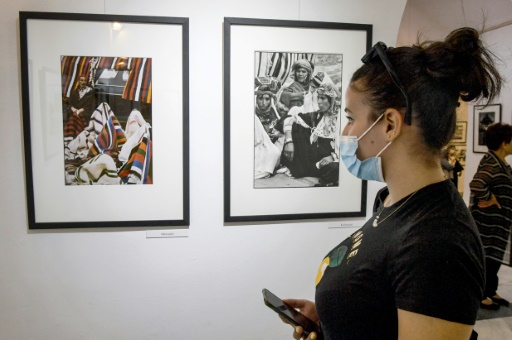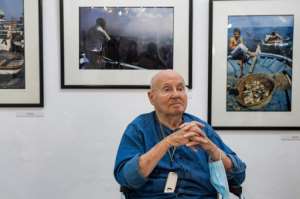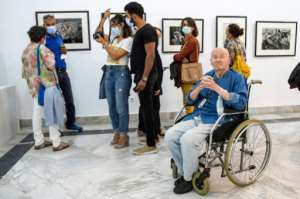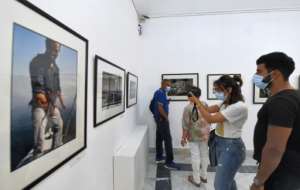
[ad_1]
“It’s the eye that takes a photo, not the camera,” explains Jacques Perez, 90, who has always kept his curiosity for his homeland, Tunisia.
An exhibition of his work entitled “Souvenirs d’Avant l’Oubli” is held until the end of October in a palace in the medina of Tunis, the old town where he was born and where he still lives.
“I didn’t study to take pictures – no need. It’s all about seeing. I like looking 360 degrees and showing what I saw,” he said. “It was not a vocation, it came on its own.”
Perez recounts having started photography at the age of 11 or 12: “I was lucky to have a German mother and an Italian grandmother who gave me illustrated magazines” and educated his gaze.
 Born to a Tunisian father and a German mother, Perez, 90, says he started photography between the ages of 11 and 12. By FETHI BELAID (AFP)
Born to a Tunisian father and a German mother, Perez, 90, says he started photography between the ages of 11 and 12. By FETHI BELAID (AFP) After 15 years of amateur photography alongside a teaching position, he was commissioned by a major Tunisian publisher to create a photo book of Sidi Bouzid, a poor but picturesque blue and white town, which launched his career.
In the exhibit, all of his works are “inhabited” by people, Perez said. “People talk to me, their faces intrigue me, I would like to know what is behind them.”
This idea is at the heart of the work of internationally renowned photographer Perez, from the United States to France.
He is “a humanist photographer”, like those who inspired him, including Robert Doisneau, Henri Cartier-Bresson and Elliot Erwitt, declared the curator of the exhibition Hamideddine Bouali.
“Everything is intuitive”
Perez never wanted to photograph his own country, in all its diversity.
“I only feel concerned by Tunisia,” he said.
 The 70 photos in the exhibition cover the extent of his work: the sea and fishermen, the daily life of Tunisians, the old trades. By FETHI BELAID (AFP)
The 70 photos in the exhibition cover the extent of his work: the sea and fishermen, the daily life of Tunisians, the old trades. By FETHI BELAID (AFP) The 70 photos in the exhibition cover the extent of his work: the sea and fishermen, the daily life of Tunisians, ancient arts and crafts.
Some of the most striking images are portraits of women, notably “La Dame de Chebika” and “La Dame au lion”.
Both were spontaneous portraits of Perez, who enjoys interacting with his subjects and avoided “stolen” images or those taken from afar with telephoto lenses.
In the age-wrinkled Lady of Chebika, “her face interested me but I didn’t know if I could approach her,” Perez said. “I got closer, she didn’t react. I got closer again and she nodded to me. I took the picture.”
“Everything is intuitive,” he said, stressing that “photographers have this ability to predict the next move”.
 For the exhibition, which is held near his birthplace, he chose “iconic photos … always framed, geometric and always inhabited” by people. By FETHI BELAID (AFP)
For the exhibition, which is held near his birthplace, he chose “iconic photos … always framed, geometric and always inhabited” by people. By FETHI BELAID (AFP) He himself is astonished to have been able to seize the moment when a drop fell from the pot of a water carrier.
It is about “patience”, he said, knowing “to wait for the right moment without provoking it”.
But he remains humble, specifying that “I do not take myself seriously. I am neither the father, nor the cousin, nor the grandfather of Tunisian photography. I am only a photographer in Tunisia”.
Source link